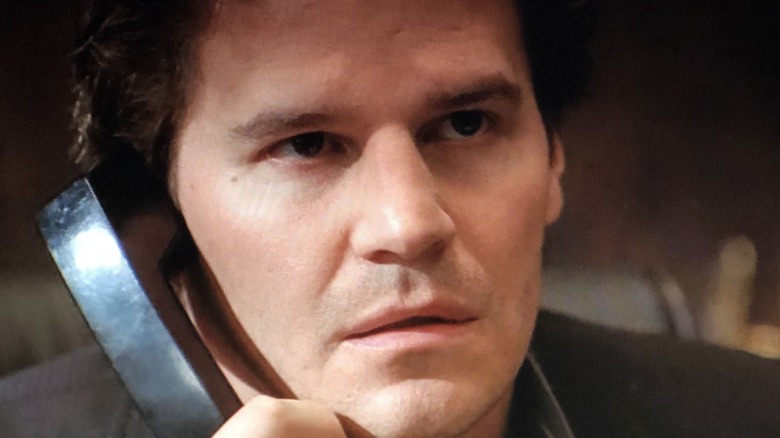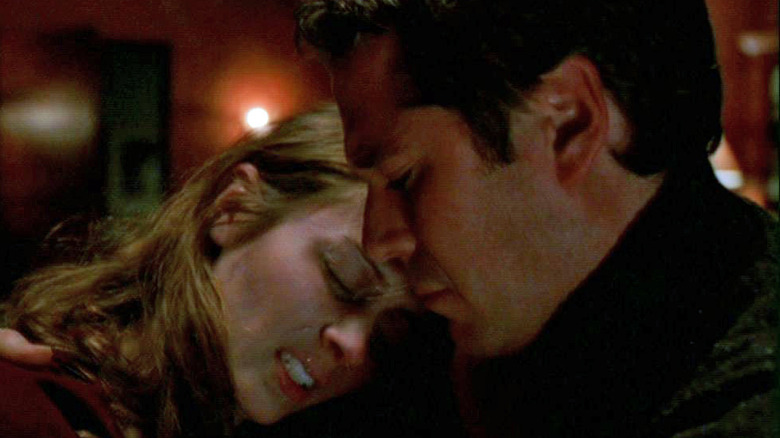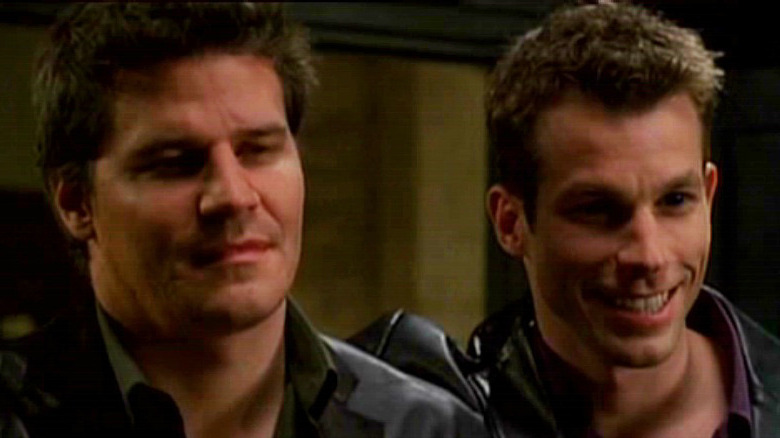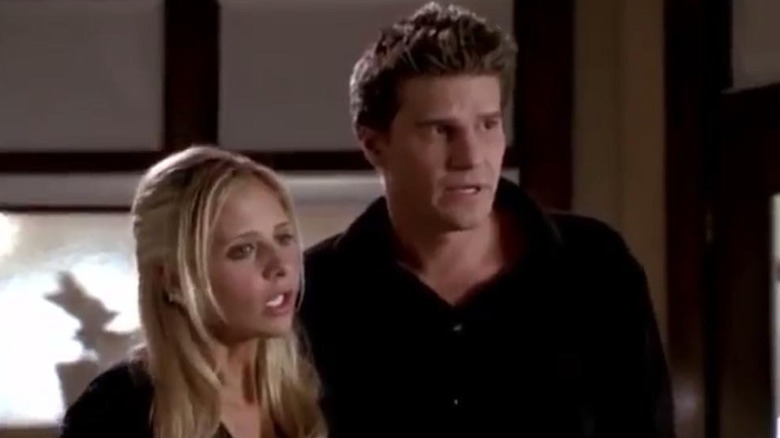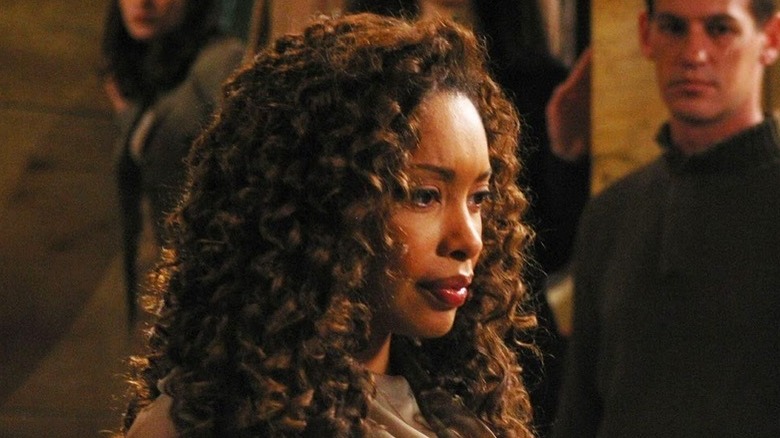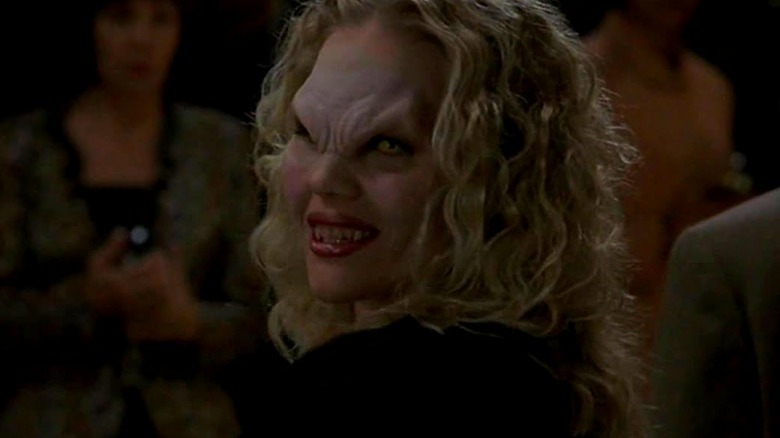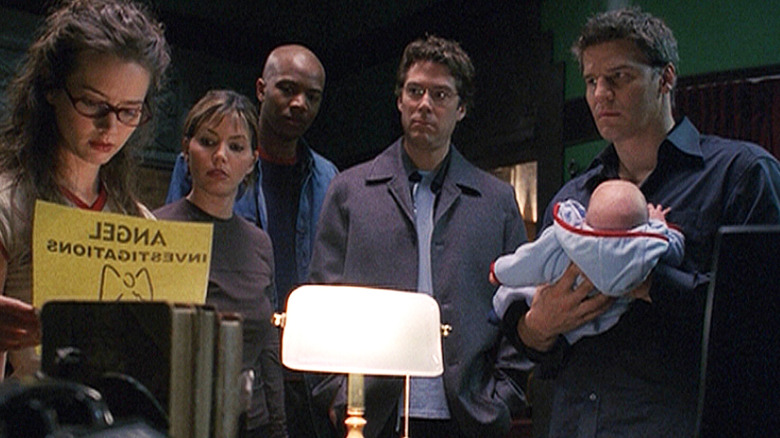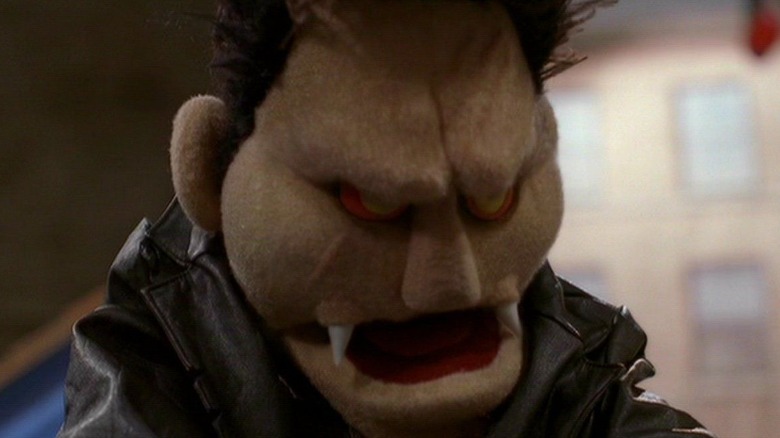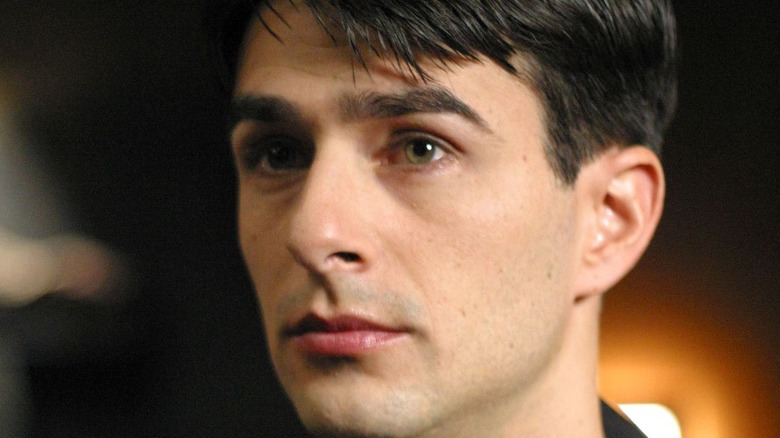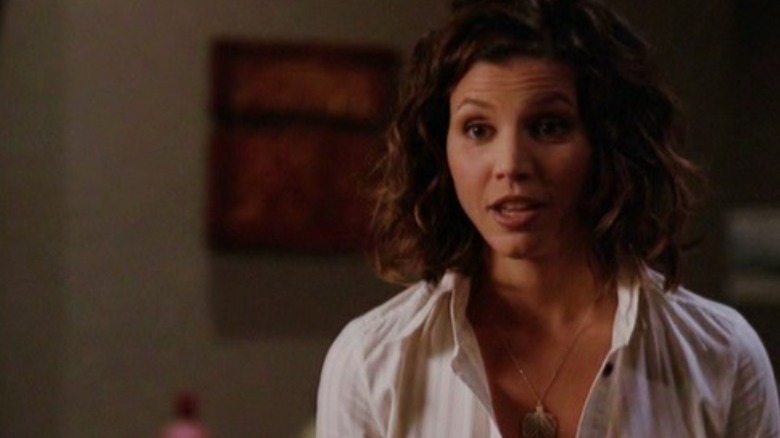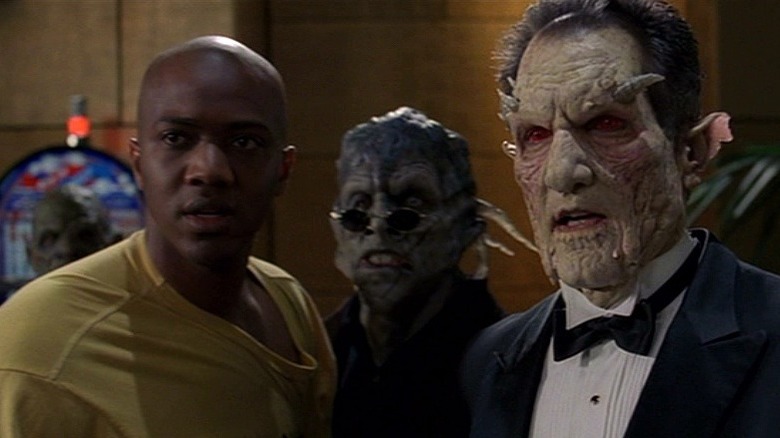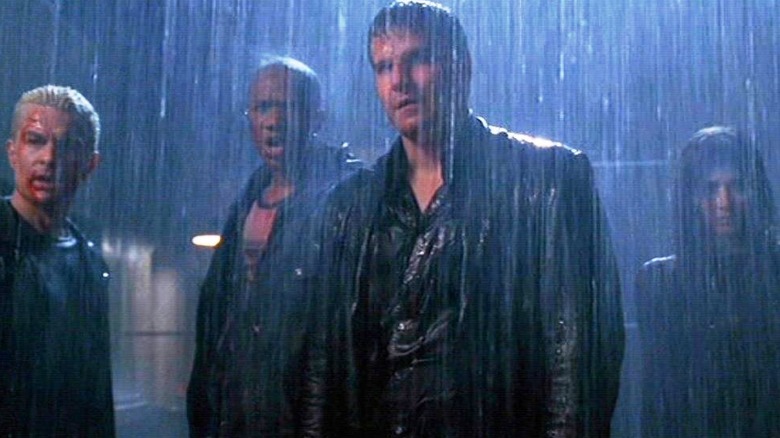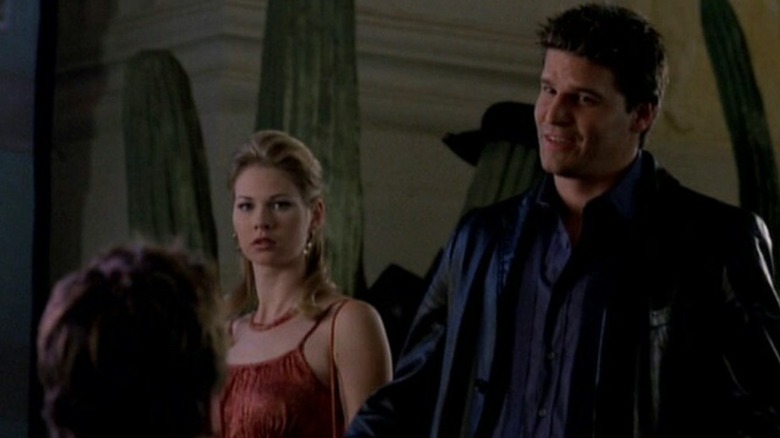The Best And Worst Episodes Of Angel
Co-created by Joss Whedon and David Greenwalt, "Angel," the horror noir spin-off of "Buffy the Vampire Slayer," follows Buffy's ex, Angel, the socially-awkward vampire with a soul, as he stalks the streets of Los Angeles and works on atoning for several lifetimes' worth of sins. He teams up with others, including fellow "Buffy" alum Cordelia Chase, to form Angel Investigations, an (unofficial) detective agency intent on "helping the helpless."
Whereas the groundbreaking coming-of-age hit "Buffy" focuses on the underdog rising up to defeat evil, the grittier "Angel" examines themes of redemption. It's not about overcoming the odds. Instead, it's about the internal struggle to become a better person and make up for past misdeeds while persevering in the fight against evil — even in the face of failure and loss. Salon's Mary Elizabeth Williams even believes that "Angel" has aged better than "Buffy," noting that the spin-off also effectively operates as a "classic workplace drama."
We've taken a look at the IMDb ratings and compiled a list of the show's best and worst episodes. Ultimately, this underrated, carefully constructed, and drastically underappreciated gem is at its best when it reflects its core themes of redemption with emotionally layered narratives that are both dark and funny. In contrast, "Angel" is at its worst when it loses sight of its mission statement, oversimplifying those themes while presenting stories that lack a clever blend of horror and humor in favor of shallower moral messages. Here are the best and worst episodes of "Angel."
Best: A Hole in the World (Season 5, Episode 15)
"A Hole in the World" opens with a flashback of Fred (Amy Acker) getting ready to go off to school in LA and promising her worried mother that her life will be dull. In present times, Wesley (Alexis Denisof) and Fred, whose life is anything but dull, are riding the highs of having finally declared their love for each other. Meanwhile, Spike (James Marsters) and Angel (David Boreanaz) heatedly argue over whether cavemen or astronauts would win in a fight.
The story's tone soon shifts from playful to devastating when Fred becomes deathly ill after touching the lid of a sarcophagus containing the spirit of an ancient demon, Illyria. From there, the demon's essence latches onto Fred, hardening her skin and shaping her into the perfect vessel. As Fred's health rapidly deteriorates and she starts losing memories, the panic-stricken team searches desperately for a cure. Angel and Spike eventually find a way to save her, but they also learn that doing so would cost thousands of lives.
With high marks on IMDb, this episode marks the tragic loss of sweet, sunny Fred and the abrupt introduction of powerful, empathic Illyria. Fans like Redditor u/cervezamonkey claim this poignant, hard-hitting entry is "masterfully done," and other users like u/discdarkpot declare it "heartbreaking." "A Hole in the World" solidifies itself as one of the show's best because it harkens back to one of the central ideas of "Angel" — no matter who falls, you keep fighting.
Worst: Couplet (Season 3, Episode 14)
In "Couplet," both Angel and Wesley struggle with watching the people they love enjoy the company of others. While Angel broods over the Groosalugg's (Mark Lutz) arrival and Cordelia's (Charisma Carpenter) clear affection for the man, Wesley endures the budding romance between Fred and Gunn (J. August Richards). Cordelia joins the club of sexually-frustrated team members when she has a vision after kissing Groo, sees him as a spine-y demon, and is reminded that if she and Groo have sex, she could lose her premonitions. An envious Angel is not particularly enthused about being paired up with Groo when the gang splits up while tracking down the demon from Cordelia's vision, and Cordy giving Groo a haircut certainly doesn't help matters. It's worth noting that even the case Angel Investigations works in this episode is love-themed.
Although there are certainly lower-rated episodes listed on IMDb, "Couplet" is still considered one of the show's worst. The gang is focused on their romantic relationships, and because they're mostly concerned with what — and who — they want, no one's working toward being a better person. As a result, the core theme of redemption gets overshadowed by simpler moral journeys layered with romance and lust. While it serves as mostly fluff, "Couplet" does plant the seed of a larger plot arc as Wesley frets over a prophecy he's translated about Angel and Connor (Vincent Kartheiser) that suggests "the father will kill the son."
Best: I Will Remember You (Season 1, Episode 8)
"I Will Remember You" is an episode that rates very highly on IMDb. Here, Angel and Buffy (Sarah Michelle Gellar) experience some fleeting happiness while still staying true to Angel's personal journey and the show's theme of redemption.
Buffy arrives in LA following Angel's visit to Sunnydale, where he lurked in the shadows without even saying hello, cueing one of their usual spats, which is soon interrupted by a demon assassin. While the two are able to fight the demon off, it gets away, and they decide to track it down. While traveling through the tunnels, they agonize over their star-crossed lover status before splitting up. Buffy heads into the daylight to search for the assassin, and Angel continues through the tunnels, where the demon lies in wait for him.
Although Angel seemingly defeats it, its blood mixes with his own, healing his cut hand and bringing his undead body back to life. Stunned, Angel finds he is released from his fealty as a champion for The Powers That Be and is very, very hungry. We then see a now-human Angel experience genuine joy without losing his soul. After he and Buffy gorge on sex and food, Angel delights over cookie-dough ice cream and chocolate. However, Cordy waits in anticipation for the world to fall apart, because, as she tells Doyle (Glenn Quinn), that's just what happens when Angel and Buffy get groin-y with each other. And, well, she's not wrong.
Worst: Shiny Happy People (Season 4, Episode 18)
"Shiny Happy People" follows the aftermath of the ritual "Cordelia" goaded Connor into. The result is a comatose Cordy and the birth of her and Connor's otherworldly offspring. The newly-reborn ancient being, Jasmine (Gina Torres), takes the form of a beautiful woman who seems to enchant everyone around her. Angel and Connor are no exception. The vampire, who initially comes to kill her, expresses guilt, shame, and sorrow as he offers her his sword and tells her he deserves to be punished. Jasmine rejects this request, promising instead that Angel's suffering — that everyone's suffering, in fact — will end. Soon enough, the entire crew views Jasmine as a god-like savior intent on helping them "strip the thorns of the earth...one evil at a time." The city's homicide rates drop dramatically with Jasmine around, but her "world peace" comes at a terrible cost.
With one of the lowest rankings on IMDb, this episode earns a place at the bottom of the list not just because it loses sight of the show's core themes but also because it's the exceptionally unsatisfying end of Cordelia's character arc. We can take narrative comfort in knowing that Cordelia's not Cordelia here — she's Jasmine. But the lack of hints leading up to this big revelation is something that bugs Reddit users about Season 4. Beyond that, the recently revealed allegations that Charisma Carpenter was unceremoniously fired because of her real-life pregnancy, per Mic, feels particularly unsavory.
Best: Reunion (Season 2, Episode 10)
It's no secret that "Angel" is a much darker show than "Buffy the Vampire Slayer." The Season 2 episode "Reunion," which is among the highest-rated on IMDb, demonstrates just how deep and boundless those depths are.
In "Reunion," the Senior Partners, who bring a human Darla (Julie Benz) back to life only for her to start dying of syphilis again, succeed in their plot to have Drusilla (Juliet Landau) sire Darla and return her to her vampiric state. While Angel searches for Dru and Darla before they wreak too much havoc, the vampire ladies go on a shopping (and killing) spree. Meanwhile, Lindsey (Christian Kane), who develops a weird emotional attraction to Darla when she is briefly human again, is told by his superior, Holland (Sam Anderson), that he needs to start forming "healthy attachments" with people outside of the office. After all, even evil law firms don't want their employees to be complete workaholics.
However, Holland, who's hosting a wine tasting office party at his house, makes the mistake of mentioning that fact when he assures Darla that she and Dru have the support of Wolfram & Hart if they want to engage in a massacre. Ultimately, what makes "Reunion" one of the show's best episodes, aside from the masterful blend of horror and humor and its jaw-dropping conclusion, is its emotionally layered exploration of how the road to redemption is rarely linear — and sometimes failure is a devastating reality.
Worst: Provider (Season 3, Episode 12)
"Provider" follows new dad Angel on his obsessive quest to financially provide for baby Connor. Despite Cordy's request that they remember their first (and most important) mission is to "help the helpless," the now very money-minded Angel Investigations is officially online, and the team posts flyers throughout the city advertising their services. All they have to do is wait for the phone to ring.
Soon, the hotel lobby is bustling with humans and demons alike waiting to be helped, but Angel is only interested in clients with means. As Angel snaps up the cases that promise a nice paycheck, Wes and Gunn protect a young woman from her undead ex-boyfriend (only to find she's the one who poisoned the guy in the first place), and a group of untrustworthy demons offer $50,000 to Fred for solving a complicated puzzle. During all of this, Cordelia takes care of Connor, making annoyed quips about how "Your dad is out right now, fighting evil — for money."
With its low ranking IMDb, "Provider" earns a place as one of the worst episodes of "Angel" because it oversimplifies the core themes, stripping the storyline of any nuance or emotional depth. When all is said and done, the message here essentially boils down to something along the lines of "family and the mission are most important, and money isn't everything, but it's kind of important too."
Best: Smile Time (Season 5, Episode 14)
The absurd, delightful, and horrifying "Smile Time," with its impressive rating on IMDb, is top-tier "Angel." When the team learns a popular show for children, which is produced by a cast of demonic puppets, is responsible for a number of sick children, Angel visits the program's studio to investigate. However, life goes from weird to bizarre when he finds himself transformed into a puppet.
With Fred declaring Angel "so cute," and Spike laughing at the "wee little puppet man," the broody vampire with a soul has to contend with a foam body, a detachable nose, and the possibility of becoming a chew-toy for werewolf girlfriend Nina (Jenny Mollen) during the full Moon. Meanwhile, Fred confesses her love to the oblivious Wesley, and Gunn is alarmed to find all the brain-power the Senior Partners infused him with dissipating. Notably, the actions he takes here to make those fading skills permanent will soon come with fatal consequences.
A memorable classic, this episode even enjoyed a 2005 Hugo Award nomination in the best dramatic presentation category. More than that, with Angel overcoming his mental state, him and Wesley gaining some lost self-esteem, and Gunn's short-sighted self-interest, it manages to thoroughly reflect the series' core themes of redemption, failure, and perseverance. Add to that the masterful puppetry, and "Smile Time" somehow presents an emotionally layered narrative that can boast the perfect balance between outrageous comedy and grotesque horror.
Worst: Why We Fight (Season 5, Episode 13)
"Why We Fight" features a character from Angel's bloodstained past coming back to haunt him, which became a relatively tired trope by the end of the show's five year run. In threaded flashbacks, we see Angel's role during World War II juxtaposed with his current Wolfram & Hart days. In the past, the budding Demon Research Initiative (also seen in college-era "Buffy the Vampire Slayer") convinces Angel to travel to the depths of the Atlantic Ocean to help retrieve a submarine trapped in enemy waters.
A reluctant Angel reaches the sub only to find several vampires terrorizing the crew members. To make matters even more frustrating, he also finds Spike dressed as a Nazi and content to keep munching on the remaining humans. When more men die and no one other than the mortally-wounded engineer, Sam Lawson (Eyal Podell), can repair the damaged sub, Angel must choose between sacrificing Lawson's life by siring him or letting every not-undead person die. In present times, Lawson, now an embittered vampire, takes Fred, Wes, and Gunn hostage in an effort to hurt Angel.
This Season 5 episode has an exceptionally low rating on IMDb, putting it squarely in the bottom tier of "Angel." However, The AV Club's Noel Murray believes "Why We Fight" effectively "combines suspense, action and comedy in entertaining ways." But by this point in the show's arc, we'd say we've had enough of the overused "blast from the past" story arc.
Best: You're Welcome (Season 5, Episode 12)
In "You're Welcome," the 100th episode of the show, Angel decides he's ready to quit Wolfram & Hart, but the others understand pretty well that leaving a job at an evil law firm will have dire consequences. The heated debate is disrupted by a well-timed phone call: Cordelia's risen from her coma, having been ripped awake by a vision of Angel in danger.
Soon, a fully-conscious and understandably shell-shocked Cordy discovers that the team now works for Wolfram & Hart, that Harmony (Mercedes McNab) is Angel's secretarial assistant, that no one even knows who Connor is and that Gunn is, in fact, not prematurely bald. She sums up her confusion with the quip, "Spike's a hero and you're CEO of Hell, Incorporated." As Cordy tries to steer Angel back toward trying to be and do better, Lindsey manipulates Spike by impersonating Doyle, intent on activating a fail-safe designed to destroy the ensouled vampire he loathes.
With one of the highest ratings on IMDb, this one's a bittersweet sendoff to Cordelia Chase. In addition to finally doing the end of Cordy's arc some justice, "You're Welcome" honors the fallen half-Irish, half-demon Doyle with a brief cameo via an old videotape and a lot of references. However, what makes this poignant, playful, and layered narrative one of the show's best episodes is that it's so keenly focused on examining the complexities of its core themes of redemption.
Worst: Double or Nothing (Season 3, Episode 18)
"Double or Nothing" sees Angel and company reeling from Wesley's devastating betrayal. Baby Connor is now gone, a hospitalized Wes is no longer part of the team or welcome at the hotel, and a grieving Angel spends his free time staring at his son's wrecked crib. For our ensouled vampire, losing Connor feels like losing his future. As Angel struggles to cope with his son's absence, Gunn gets an unwelcome blast from the past. Turns out, he once traded his soul for a truck at a demon-run casino. Now he's dating Fred and very happy, but the trouble is, his soul is not his to give, and Jenoff (Patrick St. Esprit), the casino head, can sense Gunn breaching his contract.
As reflected on IMDb, this is one of the worst entries of the series because it lacks the emotional layers that make the best installments so rich. There's no skillful nuance here. No complex, moral ambiguity. None of the show's trademark horror-noir style we've come to love. While the theme of redemption is reflected, slightly, in the fact that Wesley is now faced with rebuilding himself and atoning for his part in Connor's abduction, there's no real takeaway. In their thoughts about "Double or Nothing," Reddit users lament over the weak, unsatisfying premise. We'd add that the message is also frustratingly overdone. We should all know by now that selling your immortal soul for any reason is a bad idea.
Best: Not Fade Away (Season 5, Episode 22)
In "Not Fade Away," the show's abrupt but thematically satisfying series finale, Angel and the rest of the team prepare to wipe out the Circle of the Black Thorn and disrupt the Senior Partners of Wolfram & Hart, who are setting their apocalyptic plans in motion. The gang knows they are embarking on a suicide mission, so before night falls, they spend the day as if it's their last. For some, it really is. When this episode first aired, it received mixed reviews from critics and frustrated fans. But as Joss Whedon told TV Guide, mid-battle cliffhanger embodies the entire point of the show — "you're never done; no matter who goes down, the fight goes on."
Ultimately, this last onscreen outing expertly blends horror, comedy, drama, and tragedy while driving home the idea that redemption is a constant, complicated, non-linear, everyday struggle that's never truly won. Now that we've all had time to heal from some upsetting character ends and reflect on the show itself, this episode has become the highest-rated on IMDb. It's also here that our dark, broody vampire with a soul signs away the reward promised by the Shanshu Prophecy at the behest of the Circle. Angel knows with complete certainty that he will never become human again. There's no longer an ultimate goal or divine award in exchange for his atonement or for battling evil. Yet, he still fights.
Worst: Blood Money (Season 2, Episode 12)
With the lowest ranking on IMDb, "Blood Money" lands rock-bottom on our list, earning its place as the show's worst episode throughout its entire five-year run. Having fired Gun, Wesley, and Cordy, Angel spends this episode stalking a young woman named Anne, who works at a youth homeless shelter that Wolfram & Hart seems to have taken under its wing.
The other fractured half of Angel Investigations, now woefully unemployed, sulk in Cordy's apartment and make plans to start their own — vampire-free — agency. Meanwhile, Lindsey and Lilah (Stephanie Romanov), who are now running the Special Projects division at the demonic law firm, once again butt heads with Angel. While Angel confronts Anne about the evils of Wolfram & Hart in a weirdly creepy way, a demon from his past, Boone (Mark Rolston), approaches our two ever-plotting lawyers, claiming he wants to fight the ensouled vampire to the death.
Not only does this Season 2 episode oversimplify the show's core themes of redemption, it also just doesn't have much to say. Sure, it emphasizes the nefarious intentions of corporate law firms, and it tries to complicate "the enemy of my enemy is my friend" premise. Ultimately, though, "Blood Money" is a money-focused narrative with a few unsurprising plot twists and none of the seamless blend of horror and humor that makes "Angel" stand out.
